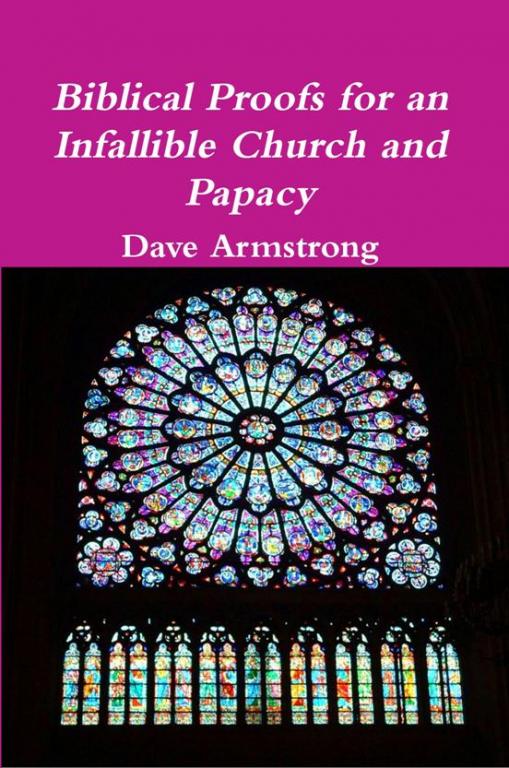
We all have to carefully decide the demarcation between the hills we would die on and the non-negotiables, and those things which should make for a broader Christian consensus across party lines. For example, if Protestants say we should ditch the papacy as historically understood (making the pope something like the Queen of England (all pomp and pageantry but no power), for us that is a non-negotiable (it would be somewhat like us demanding that a Calvinist ditch TULIP). So how do Christians co-exist given these various intractable positions on both sides? I think we have to accept each other as we are, and show respect for different traditions even though we strongly disagree with elements in them, and rejoice in our true common ground. That’s what I try to do, anyway.
Vatican I wasn’t even (technically) “ultramontane” in its conclusions — truth be told. The ultramontanes (people like Cardinal Manning) wanted an even broader range of papal infallibility, to include virtually everything the pope said. What was passed was quite a moderate form of papal infallibility. The “moderates” won the day, not the radicals. And that was precisely because they took a realistic view of history: the Honorius and Vigilius and Liberius incidents, for example, made a broader definition impossible because it would not be true to the facts of history.
For Catholics, the papacy as presently defined is non-negotiable. It is a dogma. That’s simply how it works in Catholicism. But we’re not the only ones with dogmas. Everybody has non-negotiables.
Vatican I was a quite moderate position, given the true Ultramontanism of the time. The more radical position lost, and it lost decisively, because once the ex cathedra definition is given, it is irreversible. So what some consider the triumph of this radical papalism was actually its profound defeat. The pope’s infallibility was strictly limited.
To submit to the Church means this, first you will receive as de fide whatever she proposes de fide . . . You are not called on to believe de fide any thing but what has been promulgated as such — You are not called on to exercise an internal belief of any doctrine which Sacred Congregations, Local Synods, or particular Bishops, or the Pope as a private Doctor, may enunciate. You are not called upon ever to believe or act against the moral law, at the command of any superior. (The Letters and Diaries of John Henry Newman [LD], XX, 545 [in 1863], edited by Charles Stephen Dessain (London: 1961-1972), in Ian Ker, John Henry Newman: A Biography, Oxford University Press, 1988 [764 pages], 530-531)
[W]hat the Pope said ex cathedra, was true when the Bishops had received it — what has been passed, is to the effect that what he determines ex cathedra is true independently of the reception by the Bishops — but nothing has been passed as to what is meant by ‘ex cathedra’ — and this falls back to the Bishops and the Church to determine quite as much as before. Really therefore nothing has been passed of consequence. Again, the degree is linked to ‘faith and morals’ — whereas what the Ultra party wished to pass was political principles. (LD, XXV, 219, in Ker, ibid., 658)
Closer study of the definition showed that the Council had only taught the moderate view of infallibility which Ryder, for example, had maintained against Ward . . .
There was no doubting the Ultramontane party was deeply disappointed that the definition could not be used, in particular, to enforce rigorously the Syllabus of Errors . . .
As usual, too, Newman refused to ignore what was true and acceptable in a development which he deplored for other reasons. Disgust with Ultramontane excesses should not be allowed to obscure the original, valid, Ultramontanism of, for example, Montalembert, who had opposed Gallicanism as allowing the state to interfere with the spiritual independence of the Church. The freedom of the local Church from political domination depended on Rome’s central authority.
. . . He was sure that it was divine intervention which had prevented the extreme Ultramontanes, including the Pope, from getting through a much stronger definition. It was a pity that Dollinger and others persisted in exaggerating what actually had been defined . . .
The Ultramontanes had not achieved all that they wanted at the Council.
[Newman thought] It was simply playing into the hands of the extremists to exaggerate the terms of the definition, which in fact had been a ‘defeat’ for the Ultramontanes. (Ker, ibid., 658-660, 662, 665; for the last statement, see LD, XXV, 438)
[I]n a letter of March 1870, . . . he pointed out that however infallible the Pope might turn out to be, his pronouncements would still require interpretation. The same was true of a Council’s definitions, which — just as ‘lawyers explain acts of Parliament’ — had to be explained by theologians. Obvious as the fact might be, the conclusion to be drawn from it had serious consequences for the fantasies of extreme Ultramontanism. ‘Hence, I have never been able to see myself that the ultimate decision rests with any but the general Catholic intelligence’ . . . (Later, in the Letter to the Duke of Norfolk, he was careful to emphasize that he simply meant that the whole Church ratified a definition as ‘authentic’, not that the ‘subsequent reception’ actually entered into the ‘necessary conditions’ of a dogmatic decision.) In the same private letter he also noted that abstract definitions could not ‘determine particular fact’: the doctrine, for example, that there was no salvation outside the Church did not apply to people in ‘invincible ignorance’ . . .
He continued to insist after the definition that ‘the voice of the Schola Theologorum, of the whole Church diffusive’ would ‘in time make itself heard’, and that ‘Catholic instincts and ideas’ would eventually ‘assimilate and harmonize’ it into the wider context of Catholic belief . . .
In defining doctrines, Popes and Councils enjoyed an ‘active infallibility’, but more was involved in the infallibility of the Church than that, since a ‘passive infallibility’ belonged to the whole Catholic people, who had to determine the force and meaning of these doctrinal definitions . . . (Ker, ibid., 681-682, citing Difficulties of Anglicans, II, 372; LD, XXV, 71, 284, 447; XXVII, 338)
In the event, however, of ‘a false interpretation’ of the infallibility definition, then ‘another Leo will be given us for the occasion’. The reference is to Pope St. Leo’s Council of Chalcedon, which, ‘without of course touching the definition’ of the preceding Council of Ephesus, ‘trimmed the balance of doctrine by completing it’. The warning is an exact prophecy of the theology of ‘creeping infallibility’ that came in the wake of the First Vatican Council, and of the Second Vatican Council, which Pope John XXIII convoked nearly a hundred years later. (Ker, ibid., 683-684, citing Difficulties of Anglicans, II, 307)
As regards the relation between history and theology, Newman is unequivocal in his criticism of Dollinger and his followers . . . ‘I think them utterly wrong in what they have done and are doing; and, moreover, I agree as little in their view of history as in their acts.’ It is not a matter of questioning the accuracy of their historical knowledge, but ‘their use of the facts they report’ and ‘that special stand-point from which they view the relations existing between the records of History and the communications of Popes and Councils’. Newman sums up the essence of the problem: ‘They seem to me to expect from History more than History can furnish.’ The opposite was true of the Ultramontanes, who simply found history an embarrassing inconvenience.
. . . Newman’s carefully nuanced judgement mocks both the intransigence of Pio Nono and the inconsistency of a politician like Gladstone. (Ker, ibid., 684-685, citing Difficulties of Anglicans, II, 309, 311-312)
880 When Christ instituted the Twelve, “he constituted [them] in the form of a college or permanent assembly, at the head of which he placed Peter, chosen from among them.” Just as “by the Lord’s institution, St. Peter and the rest of the apostles constitute a single apostolic college, so in like fashion the Roman Pontiff, Peter’s successor, and the bishops, the successors of the apostles, are related with and united to one another.”
889 In order to preserve the Church in the purity of the faith handed on by the apostles, Christ who is the Truth willed to confer on her a share in his own infallibility. By a “supernatural sense of faith” the People of God, under the guidance of the Church’s living Magisterium, “unfailingly adheres to this faith.”
Things got a little out of balance after Vatican I (itself a defeat of radical Ultramontanism), just as they do after virtually all Councils. Dollinger went too far in one direction, and the Ultramontanes (who wanted a much broader definition) in the other. Then Vatican II came around to balance things, and to emphasize collegiality and laity. The liberals misunderstood that and tried to use it as a bogus excuse for liberal dissent, when in fact, the Council sanctioned no such thing. And the so-called “traditionalists” reject it altogether because they are not in tune with the Mind of the Church, and have a spirit of disobedience, just as Dollinger did, and as the liberal “Catholics” do. So everything works out in the long run.
Vatican II further clarified and developed Vatican I and made it even more clear that the pope (though he is the head and exercises jurisdiction and a “veto power”) is not an “absolute monarch.” He always works together with bishops and Councils and the laypeople. The definition of the Assumption of Mary, for example, was made only after considering many thousands of letters from the laypeople, who overwhelmingly favored the definition.
It is only the Catholic position which remains true to both ideals and to the forms we see in NT ecclesiology. We alone have a pope and also a conciliarism and episcopacy, just as there was the primacy of Peter and also the power to bind and loose of the other disciples. For us, papacy and conciliarism do not conflict, as long as the pope has the power of approval (much like the President has with regard to bills from the Senate and House of Representatives). By a sort of “advise and consent” relationship, the pope can and does take into account opinions of others in the Church.
The pope is a servant of the tradition. He has no power to overturn that tradition, and if he tried, he would be opposed (and possibly deposed), and this would be a perfectly Catholic thing. John XXII is a perfect example. He tried to make a false statement about the Beatific Vision, was widely and strenuously opposed, and withdrew his position.













